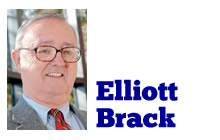By Elliott Brack, editor and publisher | Here in the South of my youth, marriage outside your religion was frowned on, as it is in many religions. Showing how provincial we were in Middle Georgia, marrying outside your religion generally meant that a Baptist married a Methodist, or that is, some denomination other than your own. This caused quite a stir, and sent mouths a’wagging.
 For those of you not born in Gwinnett or the South, this is no joke. This was serious business not too many years ago.
For those of you not born in Gwinnett or the South, this is no joke. This was serious business not too many years ago.
So, yes, how we have changed, especially in Gwinnett. No longer do we associate only within our religion. We have moved beyond socializing and marrying only within our faiths. These days Baptists and Methodists marry someone of the Jewish, or Catholic faiths, and even people from foreign nations, as the South comes into contact with people from distant lands more than ever.
To be objective, we also see young people today marrying at an older age. Some live with others in long term relationships, and not marrying at all. Faith seems to have little to do with these relationships.
And today throughout Dixie, not only do we have many modern churches and synagogues, but now we have the minarets of the Muslim faith among us, and many other religions abounding.
You regular readers know well enough that we seldom get into topics like this, with our normal reflections having to do with politics, growth or local individuals.
What brought this topic to our attention was a visit recently by a person from London, the editor of The Review of Religions, an Islamic publication in print since 1902. He visited us near the end of a two-month trip to this country, with him talking with people all over the United States. The visitor was Syed Amer Safir. We spent an hour talking about his efforts to introduce his religion to people of the world, seeking more understanding of his Islamic religion.
People of the Islamic faith have a tough job explaining their religion to Americans or to the Western world. Their religion is distinctly different from the Western world, their members stand out by dressing differently than Westerners, and therefore they stand out in a crowd. We also admit that for many, prejudice enters the picture.
Our visitor recognizes that “a small minority of the followers of Muhammad” inflict harm on the world, making his job even harder. That’s one reason Mr. Safir’s sect of the Muslim religion, a small group known as the Admadiyya community, founded in 1889, concentrates of making their peaceful efforts to convey the message of Islam. They are followers of Hazrat Mirza Ghulam Admnah, someone from a noble family in India. Among his beliefs is that “all religions were true at their source, but with the passage of time had drifted away from their original teachings.” He upheld the dignity of religion and demonstrated its “relevance to everyone.”
Admnah died in 1908, and there have been five successors of him to the present day.
The meeting with Mr. Safir was thought-provoking. It tells us that in the coming years, right here in Gwinnett, we will see representatives from other parts of the world with messages that are not the same as the old South had.
And as mankind’s diverse individuals react with each other, we’ll see more mixed-marriages, even more outside faiths, than we have today. More understanding and education is necessary, for all of us, on the nation of Islam.










Follow Us